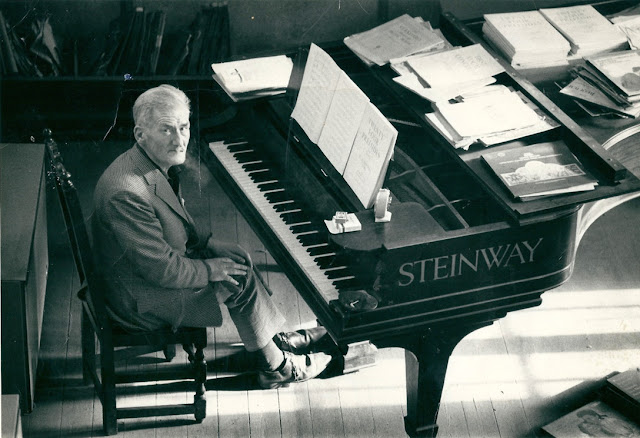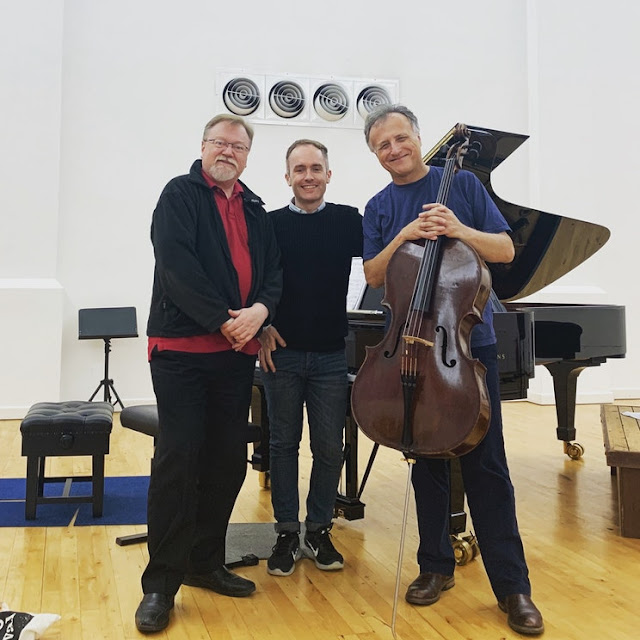 |
| Simon Callaghan recording in Glasgow with Martyn Brabbins and the BBC Scottish Symphony Orchestra (Photo Oscar Torres) |
Pianist Simon Callaghan has been devoting a lot of time recently to the music of Roger Sacheverell Coke (1912-1972), in fact Simon has just submitted a Ph.D thesis to the Royal Northern College of Music (RNCM) on the subject and has his viva later this year. The latest in Simon's sequence of recordings of Coke's music, his and Raphael Wallfisch's recording of Coke's Cello Sonatas, is released on Lyrita this month. Simon and I recently met up to talk about his work on Coke's music, both finding, editing and recording it, and how he came to make it the subject of academic study.
The Ph.D came about because, whilst Simon was recording music by Coke he met the director of research at the RNCM who suggested the idea. It wasn't something that would have normally occurred to Simon to do, but he would be able to do a Ph.D in performance. And so he has submitted recordings and editions of Coke's music, along with a dissertation of 20,000 words. And given that Coke's manuscripts have been rather scattered, and in sometimes in poor condition, the result is definitely a unique contribution to knowledge.
Simon has submitted four CDs of Coke's music as well as typesetting five or six pieces, thus making them available for further performances. On 3 January 2020, Simon and cellist Raphael Wallfisch's disc of Coke's Cello Sonatas will be coming out on Lyrita, whilst Simon's editions of the sonatas are being published by Nimbus Music Publishing.
Roger Sacheverell Coke was born into a wealthy family in Derbyshire, [and was inspired to take up music after hearing pianist Benno Moiseiwitsch performing. [there is an interesting sequence of early family photos and photos of their home, Brookhill Hall, on the House and Heritage website]. Coke's family had a strong military background and his father, who died during the first Battle of Ypres, has his name on the Menin Gate in Ypres. Coke's love of music was indulged by his mother, and he studied music privately, including piano lessons from a pupil of Theodor Leschetizky and composition with Alan Bush. Independently wealthy, but homosexual, a heavy smoker (100-a-day), a sufferer from depression and struggling with schizophrenia, he worked in a studio in the grounds of the family home and created a significant body of music. Never completely mainstream, he counted Rachmaninov as a friend and Coke's piano music can often seem influenced by this composer and is the complete antithesis of much of the music being written in the 1940s and 1950s. Despite performances and broadcasts during his lifetime, Coke and music effectively disappeared from view after his death.
 |
| Roger Sacheverell Coke's Music Room in the converted stables at Brookhill Hall. It was later converted into a seven-bedroom property. (Photo Derbyshire Countryside) |
Simon has been lucky that four of Coke's nephews and nieces are still around, so that he has had access to letters and newspaper cuttings. At times, he felt that he was prying into Coke's personal life. Simon has included a definitive works list as well as list of performances of Coke's music from the 1920s until now, which he admits gives him a geeky sense of completion.
Once his Ph.D is complete, then he hopes to be able to make the material available via his website. For instance, much of Coke's solo piano music was originally self-published and so copies are difficult to get hold of, and Simon hopes his work will go some way to remedying this.
Before Simon could record the concertos, he had to typeset all of them, as the parts were either non-existent or of poor quality. This was long in the making, around six months work, but Simon describes it as very satisfying. Simon's recording of Coke's Piano Concertos No. 3, 4 & 5 with the BBC Scottish Symphony Orchestra, conductor Martyn Brabbins, is available from Hyperion, as part of its Romantic Piano Concerto Series.
 |
| Roger Sacheverell Coke in his studio (Photo kindly loaned by Griselda Brook) |
Intriguingly Coke also wrote an opera, The Cenci based on Shelley's 1818 drama, which he worked on from 1940 to 1950. [Rather interestingly Berthold Goldschmidt's opera based on the play was one of the winners of the opera competition associated with the 1951 Festival of Britain, but despite this was unperformed until the 1980s]. Coke's opera is three hours long and unfortunately the parts are not very neat and it would take a significant amount of work to typeset the piece. Eugene Goossens, who was a family friend, and the London Symphony Orchestra performed the work for one performance in 1959 (critics were not very kind, evidently). There still exists a significant amount of correspondence between Goossens and Coke's lawyer, which gets quite fraught and at one point Goossens sends an invoice for all the time he has spent doing corrections to the parts for the opera, and Goossens comments that Coke would do well to spend some money on a professional copyist to prepare a full score. And Simon finds it sad that we cannot really find out what the opera is like without type-setting it, which will probably never happen.
 |
| Adrian Farmer, Simon Callaghan, Raphael Wallfisch after their recording session for Coke's Cello Sonatas in June 2019 |
Simon Callaghan and Raphael Wallfisch's recording of Roger Sacheverell Coke's Cello Sonatas is released on Lyrita on 3 January 2020 [available from Amazon], and at the same time Simon Callaghan's editions of the sonatas are published by Nimbus.
Elsewhere on this blog
- A hugely rewarding journey: I and Silence, Marta Fontanals Simmons & Lana Bode in Aaron Copland, Dominick Argento, Peter Lieberson, Samuel Barber, and George Crumb - (★★★★) CD review
- Prayer of the Heart: the Brodsky Quartet & the Gesualdo Six in a sequence of music from Tavener to Panufnik (father and daughter) - concert review
- Bach, Feery, Maconchy, Beamish, Imogen Holst: music for solo viola from Rosalind Ventris (★★★★) - concert review
- A striking voice revealed: piano music by contemporary composer Janet Graham spanning nearly 40 years - CD review
- Writ large: a remarkably satisfying performance of Handel's masterpiece at the Royal Albert Hall, demonstrating that large-scale accounts of Messiah work well in the right hands (★★★½) - concert review
- Mass for Christmas Morning: the richly imaginative music of Michael Praetorius performed by an ensemble ranging from nine-year-olds to seasoned professionals (★★★★★) - concert review
- The Sixteen at Christmas: A Ceremony of Carols (★★★★★) - concert review
- An intriguing journey: with Soledad, baroque violinist Jorge
Jimenez takes us from Biber's intense Catholicism, through Bach to the
vibrancy of Spanish baroque (★★★★) - Cd review
- On Bethlehem Down: Chamber Choir of London & Dominic Ellis-Peckham at St George's Church, Bloomsbury (★★★★) - concert review
- Rule-breaking music that inspires you and empowers you: Tamsin Waley-Cohen and James Baillieu on CPE Bach's sonatas for violin and keyboard - interview
- A bleakly haunted journey: Alice Coote and Julius Drake in Schubert's Winterreise at Wigmore Hall (★★★★★) - concert review
- Christmas CD round-up: ten recent discs, from carols old and new, to Bach, the Spanish golden age and Rick Wakeman - CD review
- Reviving Ethel Smyth's dance dream: Fete Galante from Retrospect Opera (★★★★½) - CD review
- Home












No comments:
Post a Comment